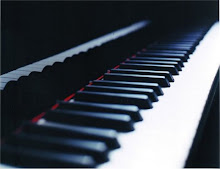Well, I don't know.
But I DO know that as I'm listening to Lauridsen or Pärt or any cello piece lately or a capella choral stuff, I get all these tingles, and, I won't lie, sometimes tears just fall and fall (and I like to let them rather than wipe them away, is that weird? Maybe).
OR sometimes the connected-ness feeling doesn't manifest itself physically quite at all, but I feel it just the same. But WHY??
There are lots of ideas as to the solution ricocheting around my head, try to follow me as I journey through them if you like.
1. As I wrote in another blog "Manifesto", I have a theory- and it holds true according to studies and just plain common sense- that people are relational beings. (Gasp! Revolutionary!) Thus, human beings have a need to feel like they belong to something- a group, whatever, label it as you please. Here's where it gets a little less certain- Music fulfills this need because it is reassurance that something exists that is bigger than the individual. I mean, how can it not? Unless you composed the music, built the instrument, and played it for solely your enjoyment, how can someone else not be fundamentally involved?
To sum up so far: Music makes us feel connected. But that doesn't answer the whole God thing. Nor does it explain why certain (types/genres of) music makes us feel more or less integrated.
2. I'll address the latter point first. Here's another earth-shattering proposal- everyone is different. Therefore, we all feel different degrees of attraction toward any one type of music. I like to think that, since I am in fact a music major, I've gained an appreciation for, and therefore a draw towards, music of a more classical feature that most people never have the opportunity to acquire (and perhaps they don't even care to, and that's all good and fine!). And if I like classical music and don't care for country, I obviously won't feel "in my element" enough to feel connected to others and God whilst listening to country. Substitute genres to your taste; the argument remains.
To sum up so far: Certain music functions as a "connector" for certain people because of the simple fact that we are all different. Let's take the classical thing a little farther, though. And I'm working on getting to the God part, I haven't forgotten.
3. *The upcoming paragraph has the potential to get pretty jargon-laden, so feel free to skip on through if you don't want to read about harmonic analysis and minimalism and the like. Then again, I haven't written it yet, so it might not.*
Arvo Pärt's "Fratres" has been a big part of this whole web of messy ideas. The violin/piano version especially. It begins with quick broken chords on the violin-- media has ruined me and I at first pictured a wide shot of a car driving through the woods in a scene from any number of scary movies. THEN, then, the violin stops and the piano strikes several open chords in moderate succession. Honestly, the rest of the piece is all a blur, the first two minutes are done so well. As I reflected on this piece, I just assumed that, despite the rhythmic simplicity, the piece must be fairly complex in its harmonic structure in order to be that moving. Today, I found the sheet music and sight-read it. The whole piece consists of just six different harmonies. Six! For a ten-ish minute piece! Yet that dang piano entrance made me fall head-over-heels in awe of a 74-year-old Estonian man.
To sum up so far: Music makes us feel connected, different styles for different people. I, being a fan of pieces belonging to that of the more classical persuasion, learned that musical potency certainly does not necessarily equal complexity. Implications? Not sure yet. On to God.
4. I am more susceptible to the power of God's presence when I'm listening to music. Maybe it's because, since I feel connected to more than myself, I'm more prepared to feel in tune with God? Maybe I'm being exposed to something so powerful (yet so taken for granted) that it's impossible to not have an emotional reaction, and my personal corollary is the connected-ness I've been trying to analyze? Or maybe no one else really does feel the way I do, and I'm just a fiery music major who's hungry to feel more God in her life? Or maybe I'm drawing circles around the answer, or maybe there isn't even an answer and I should be okay with that.
Any way you slice it, it's beautiful.
As you can tell, I have by no means figured anything out, nor have I expressed my attempt to escape confusion in the most eloquent way. So, I appreciate your reading this and will appreciate even more your thoughts on the matter.
